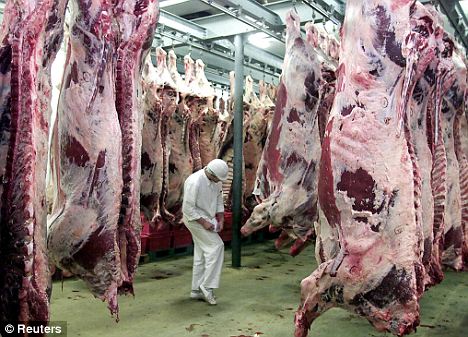
Addiction is an ugly thing. It is insidious, starting with the promise of something pleasurable, if dangerous, a promose that quickly spirals out of control until its truly destructive nature is on stark display.
But even when the “needle and the damage done” are apparent to everyone else, the addict him or herself often can’t see it. We know that can be due to changes in the Pre Frontal Cortex where self assessment resides.
Some believe that calling the ever-increasing global appetite for meat an addiction is fitting. With 9 billion animals slaughtered every year in the U.S. alone, and global demand for meat increasing every year, the demands on the world’s water and other resources and the impact that factory farming has on global climate change are starting to have real consequences.
Despite the fact that California is still in a drought that has lasted four years and counting — and may, in fact, be the worst in over 1,200 years according to some, Central Valley farmers are quickly depleting the state’s groundwater despite El Niño rains.
The drought in São Paulo, Brazil is so bad that engineers consider the water in at least one of the area’s reservoirs to be “below zero,” meaning the remaining water has to be piped uphill in order to reach the intake pipes.
And the implications for global climate change that go along with the factory farming methods favored around the world are staggering:
- Factory farming accounts for 37 percent of methane emissions, which have more than 20 times the potential for adding to global warming than C02
- Deforestation for animal grazing and feed crops emits an additional 2.4 billion tons of CO2 each year
- The USDA estimates that confined farm animals generate more than 450 million tons of manure annually, three times more raw waste than generated by Americans
- Burning fossil fuels to produce fertilizers for animal feed crops emits up to 41 million metric tons of CO2 per year
- A 2006 report by the United Nations Food & Agriculture Organization shows that livestock production is responsible for 18 percent of human-induced greenhouse gas emissions worldwide – more than all of the world’s motor vehicles combined.
But the problem with addressing these issues is that the forces behind factory farming have carefully, methodically obfuscated their role in placing enormous additional strain on the planet and its resources. The framework of conversation around meat production and consumption often focuses on the perception that eating more meat is a marker of economic and social success.
This is of course an ancient and primeval prejudice, but it is one that must be combated if we are to avoid total catastrophe.
“Meat production, globally, is an environmental disaster now,” said Ken Cook, president of Environmental Working Group. “If we try and expand production to reach 9 billion people by 2050, it will be a complete and unthinkable disaster. The problem is that our focus is on making the meat as cheap as possible.”
Any honest conversation about globally climate change–and thankfully more and more people are starting to come around to the fact that it is real and we have a hand in it—must include meat production.
It must, that is, if we hope to leave our children a world with more in it than animal manure and methane gas.
http://www.nationofchange.org/news/2016/03/06/the-shocking-consequences-of-the-worlds-meat-addiction/
